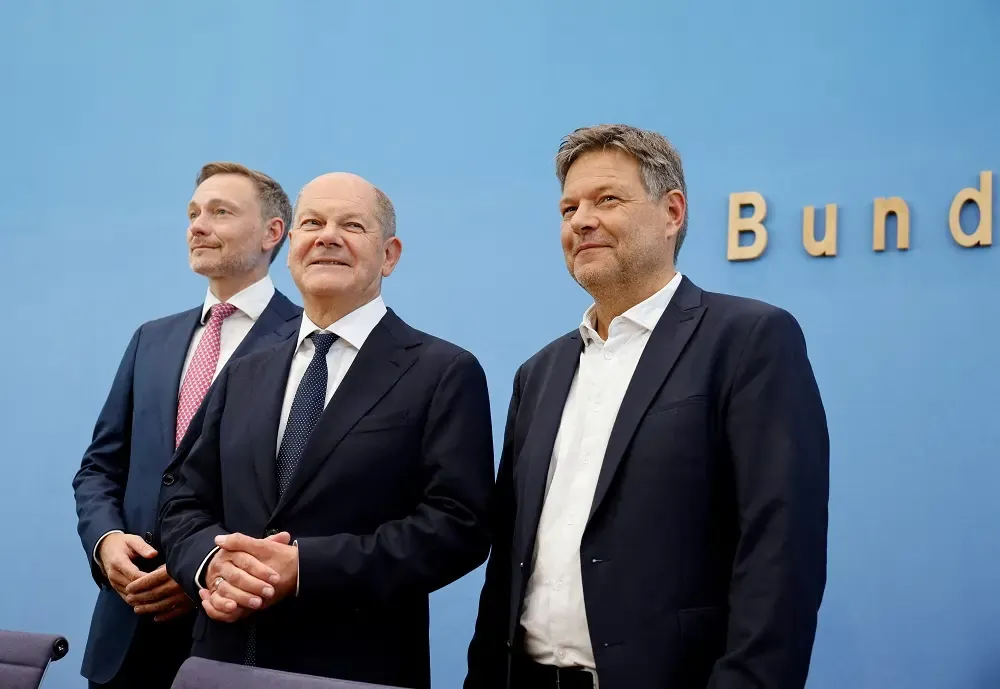
German growth package offers limited boost, say economists
By Maria Martinez and Christian Kraemer
BERLIN (Reuters) – Germany’s new economic growth package will fall short of the output boost the government says it can deliver next year, economists and business groups said on Monday.
The government on Friday presented measures to bolster growth as part of a budget deal after months of talks among Chancellor Olaf Scholz’s fractious three-way coalition. It hopes the measures will lead to extra growth of more than half a percentage point in 2025 – but others were doubtful.
“The programme to stimulate growth remains modest,” Berenberg’s chief economist Holger Schmieding told Reuters. “With luck, it may add 0.1% to 0.2% to growth next year.”
The German economy, Europe’s biggest, was the weakest among its large euro zone peers last year, as high energy costs, feeble global orders and record high interest rates took their toll.
The government forecasts the economy will grow 0.3% this year, with GDP only projected to grow by 1.0% in 2025, according to forecasts presented in April. Growth would be at 1.5% with the announced economic package.
“However, the increase in the forecast is likely to be due not only to specific measures in the recently adopted budget, but also to the overall improvement in the outlook,” said Jan-Christopher Scherer from the DIW economic institute.
At 1.3%, DIW Berlin is currently forecasting a slightly stronger increase for next year than the German government had previously assumed, but short of the 0.5 percentage points announced by the government.
May has been a rough month for the German economy. A recovery isn’t in sight in the manufacturing sector, with industrial orders and production posting unexpected declines.
Monday data showed that exports fell more than expected in May, showing that the German economy, as an export-oriented nation, will continue to struggle amid a slow recovery in global demand, geopolitical uncertainty and trade barriers.
According to the German government, estimates for the next ten years show annual potential growth of only around 0.5%.
LOW GROWTH
“Even 0.5% growth seems unrealistic at the moment,” the president of the German Chamber of Commerce DIHK Peter Adrian said, noting that incoming orders are weak, production is stuttering and there is no summer fairytale in terms of exports.
“Half a percentage point of economic growth in addition is already alarmingly low,” Adrian said, in reference to the extra growth expected by the government with its economic package.
Citi remains cautious on Germany’s economic outlook for 2024 and 2025, even when rising real incomes and rebounding global goods demand may support growth.
“The double-whammy of tight monetary and fiscal policy as well as structural issues including high energy prices are clearly weighing against that and especially on investment,” Citi’s economists said in a note.
The budget will stick to the country’s tight borrowing rules, in what is seen as a victory for Finance Minister Christian Lindner, who had stressed the importance of returning to the nation’s constitutionally enshrined cap on spending, known as the debt brake.
“Germany is still planning to tighten fiscal policy next year so the budget will not boost demand in the short term,” Andrew Kenningham, chief economist at Capital Economics told Reuters.
Torsten Schmidt, from the Leibniz Institute for Economic Research, said many measures are likely to improve the framework conditions in the medium term. “The short-term stimuli, on the other hand, are likely to be small,” he told Reuters.
Business groups gave the deal a qualified welcome.
Tanja Goenner from the BDI business association said the package will provide moderate impetus for economic growth and investment.
“The bottom line is that this is still not enough to sustainably strengthen the forces of growth,” Goenner said.
(Reporting by Maria Martinez and Christian Kraemer; editing by Mark John and Sharon Singleto)


